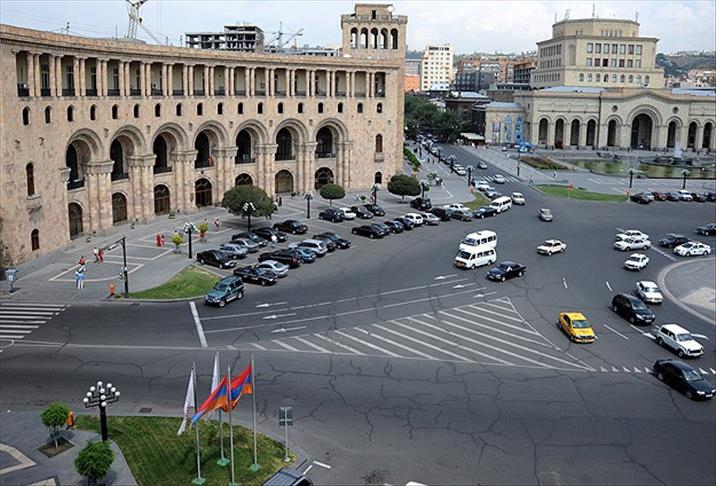
LONDON
Two historians have called on Armenia to help normalize relations with Turkey as the 100th anniversary of the 1915 events approach.
Maxime Gauin, a PhD student at Ankara’s Middle East Technical University and a researcher at the Center for Eurasian Studies, said Turkey had made every effort to improve ties with its eastern neighbor.
“Now it is up to the Armenian government,” the French historian added.
Patrick Walsh, a research fellow at University College Dublin’s School of History and Archives, called for both sides to commemorate all Ottoman victims – whether Muslim Turks or Armenian Christians – as casualties of a “great tragedy.”
Both academics spoke to the Anadolu Agency in the run-up to the April 24 centenary of the deaths of Armenians following a rebellion against the Ottoman Empire in 1915.
In Gauin’s opinion, Armenian calls for the killings to be recognized as ‘genocide’ – a claim Turkey has always refuted – have been motivated by modern considerations.
“[Armenian President] Serzh Sargsyan always made clear that he wants territory,” Gauin said, referring to Armenian claims to parts of eastern Turkey.
Walsh described the events of 1915 as a tragedy for both parties. “If the event is concentrated in the word ‘genocide,’ whether it is right or not, there will never be a resolution to this,” he told AA.
Referring to the collaboration of some Armenian nationalists with Russia and the Allies during World War I, Walsh claimed they had “taken a gamble” that did not pay off.
“They were betrayed,” he said. “The Armenians were only a useful tool for these people [the Allies]. Armenian revolutionaries took their own risks.”
Walsh claimed British foreign policy also played a role in the events of 1915 through its search for an eastern ally to confront Germany.
He said the Anglo-Russian Entente of 1907 gave the Russian Tsar the “green light to move forwards.” Britain had earlier acted on a check on Russian ambitions beyond its southern borders.
Focusing on the practical problems facing those seeking to research the 1915 events, Gauin said access to Armenian documents was restricted.
“Each time I asked for the Armenian archives… they invented a pretext or said it was not possible or they did not answer at all,” he claimed. “Turkish archives can be obtained with no problem.”
Walsh said Armenian archives are “not open as the Ottoman archives,” adding that most current research had been based on British historical sources.
Following the Russian invasion of Ottoman territory and the defection of some Armenian Ottoman troops to the Tsarist army, the Ottoman government ordered the relocation of some of the Armenian population.
War-time conditions, famine, epidemics, civil war and retribution by local groups led to the deaths of Armenians. Some historical documents demonstrate the Ottoman authorities did not intend for these tragedies to take place and punished offenders.
Following Russia’s exit from World War I following the 1917 revolution, Armenian militias terrorized parts of eastern Anatolia before the present day border was established by the Treaty of Kars in 1921.
Armenia and the Armenian diaspora have demanded an apology and compensation for the 1915 incidents and lobbied for the killings to be identified as genocide.
The Turkish government has repeatedly proposed creating a joint commission to tackle the issue by using all available archives.
The most significant development in normalizing Turkish-Armenian relations came in 2009 with two protocols proposing an impartial examination of the historical record and the mutual recognition of borders. However, Armenia’s constitutional court ruled the protocols breached a constitutional clause declaring the country “stands in support of the task of achieving international recognition of the 1915 Genocide."
Five years later, the protocols were withdrawn from the Armenian parliament.
In 2014, then Prime Minister Recep Tayyip Erdogan expressed his condolences to the relatives of all Ottoman citizens who lost their lives during in 1915, including Armenians.
In a statement released on Monday, Prime Minister Ahmet Davutoglu repeated the message and announced a ceremony to be held on April 24 at the Armenian Patriarchate in Istanbul – the first official ceremony of its kind to be held in Turkey.
Anadolu Agency website contains only a portion of the news stories offered to subscribers in the AA News Broadcasting System (HAS), and in summarized form. Please contact us for subscription options.







